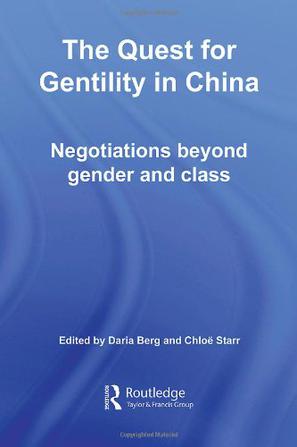Gentility found at the root of Chinese history

The Quest for Gentility in China: Negotiations beyond Gender and Class
Author: Daria Berg and Chloë Starr
Publisher: Routledge
Daria Berg and Chloë Starr, the two editors of the book, The Quest for Gentility in China: Negotiations beyond Gender and Class, are both British Sinologists and Oxford graduates.
When they were at Oxford, David Faure emphasized that the concept of gentility could be found at the root of many Chinese cultural and historical issues. In 2002, Berg organized an interdisciplinary international conference on ‘Perceptions of Gentility in Chinese Literature and History’ when she was teaching at Durham University. Papers released at this conference make up much of this book.
The 12 papers are divided into three parts, “event,” “reflection” and “transmission.” The multi-disciplinary approaches mean that they cannot be categorized into traditional historical research on gender, class, social hierarchies or political power. But the concept of “gentility” can be tied to any perspective or the perspectives mentioned previously.
In the preface, the editors take their readers back to the year 353, when a group of friends, including calligrapher Wang Xizhi and his friends Xie An and Sun Zhuo, gathered on a late spring excursion in a pavilion in the mountains near the town of Kuaiji. They sat admiring the scenery, laughing and drinking, then composed poems to mark the occasion. Berg and Starr hold that this trip profoundly impacted China in “expressing and shaping the contours of a genteel ideal for dynasties to come.”
There are four papers concerning the revival of “gentility” in modern society. Ellen Widmer studied the first female-written travelogue Shan Shili’s Guimaolüxingji and compared it with three other peers, showing “how late-Qing writers of a reformist cast of mind were conceptualizing the ‘new woman.’ ” But in terms of independence and freedom, the four modern female writers failed to make strides.
In her study of the 1930s magazine for women Linglong (Elegance), which was also favored by female writer Zhang Ailing, Barbara Mittler suggested that the popularity of the magazine was due to “extreme countering of misogyny with a new breed of misandry.”
Other chapters in the book discuss themes from more ancient times. Four of them are related to the late Ming Dynasty (1368-1644), giving diverse perceptions of “gentility.” For example, Alison Hardie examines women’s gentility expressed in garden culture. Sarah Dauncey investigates the relationship between the simple clothing ornamentation of female gentry in the late Ming Dynasty and their perceptions of beauty.
In order to probe into the concept of “gentility,” all the 12 papers review, question and explore related themes. Their key points lie beyond the boundaries of social scientific disciplines and examine customs, clothing habits, literature, garden culture and history along with abstract concepts.

 PRINT
PRINT CLOSE
CLOSE